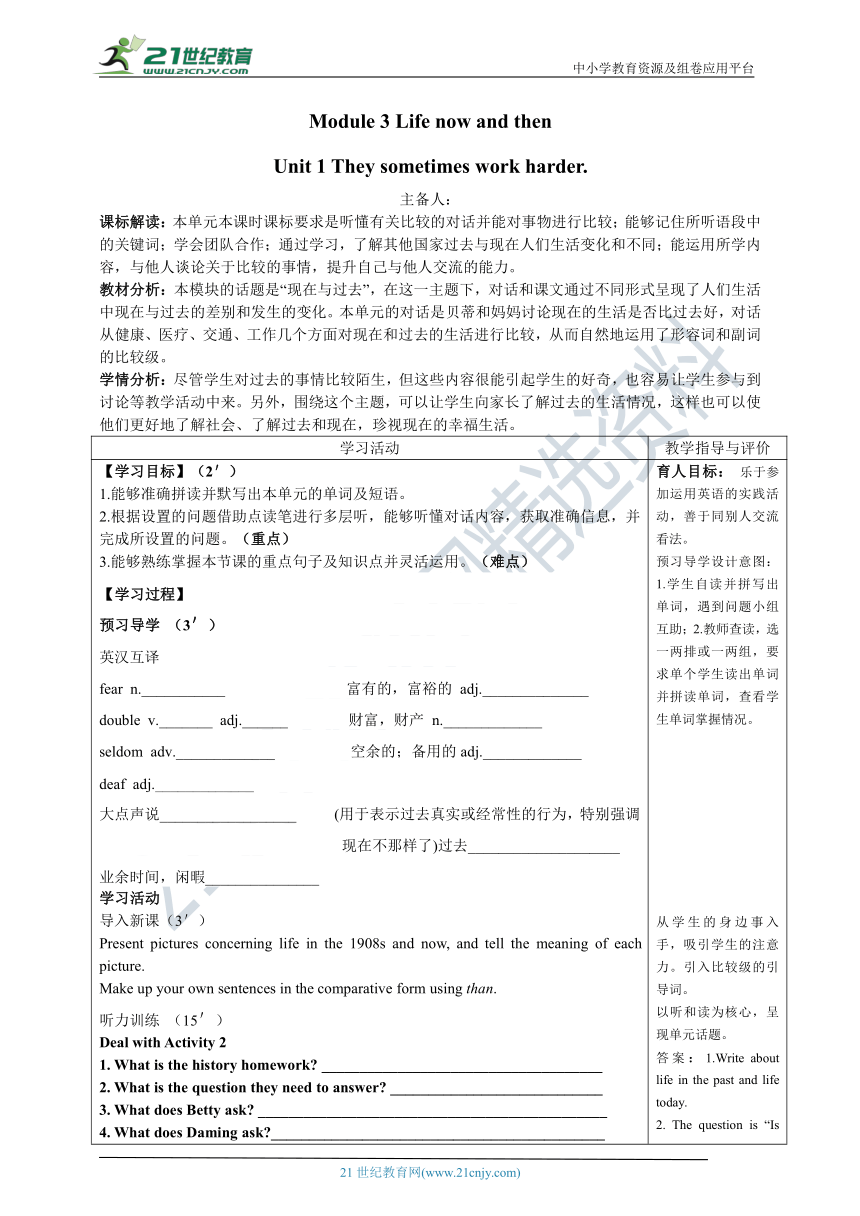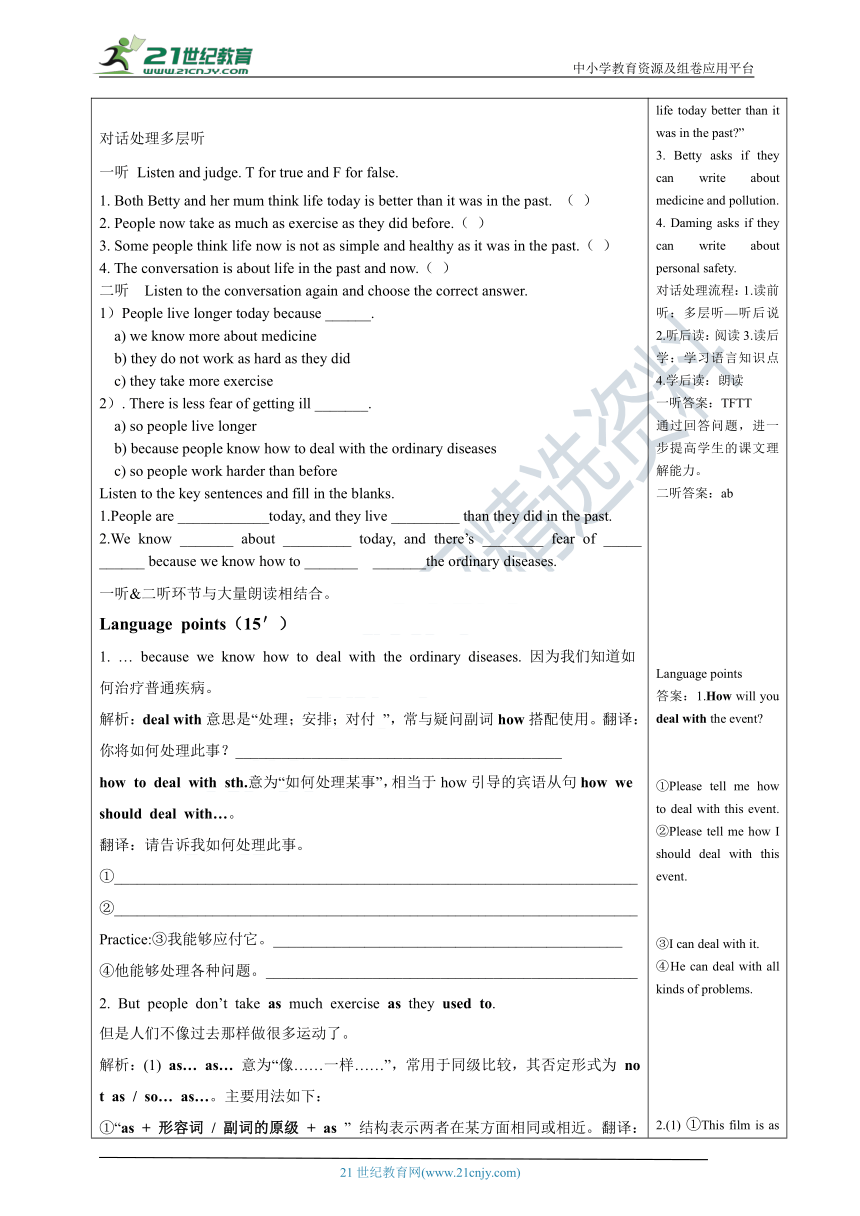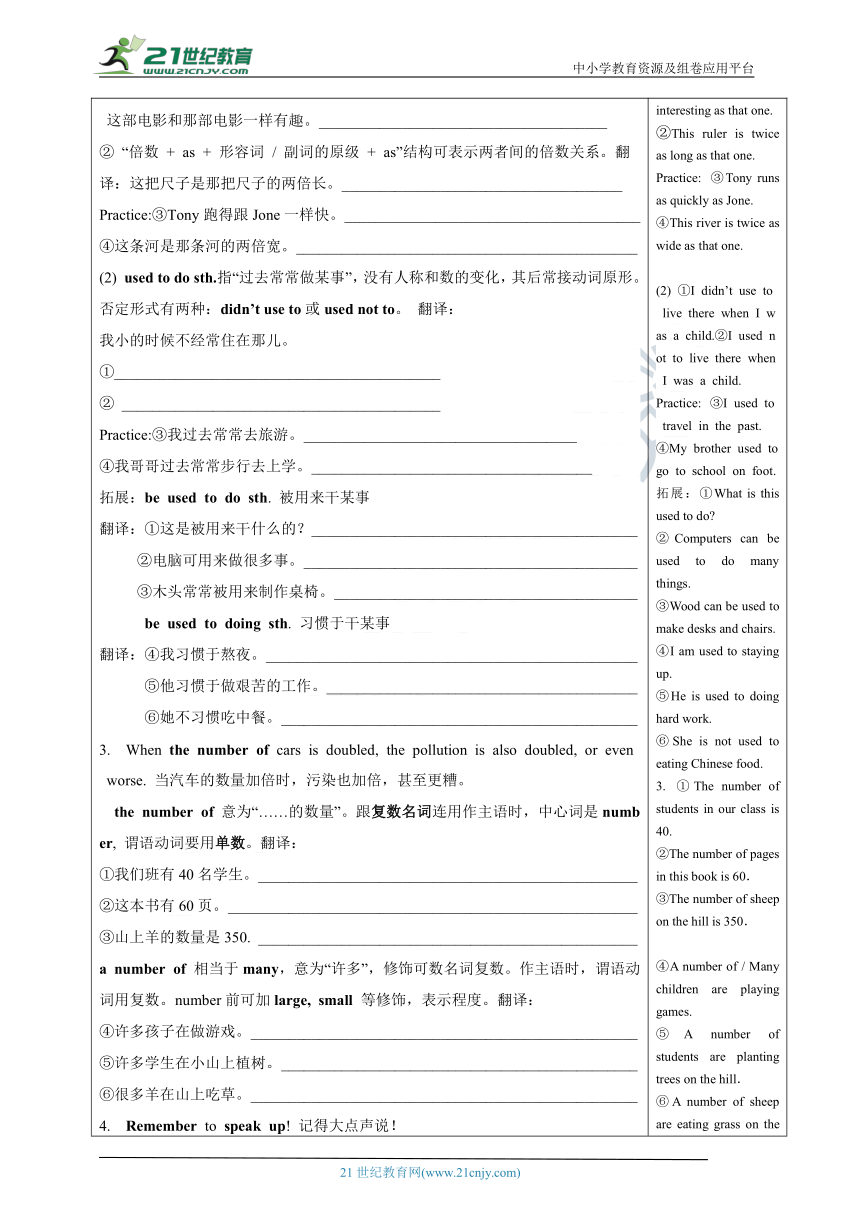Module 3 Life now and then Unit 1 They sometimes work harder.导学案
文档属性
| 名称 | Module 3 Life now and then Unit 1 They sometimes work harder.导学案 |

|
|
| 格式 | zip | ||
| 文件大小 | 1.2MB | ||
| 资源类型 | 试卷 | ||
| 版本资源 | 外研版 | ||
| 科目 | 英语 | ||
| 更新时间 | 2020-02-16 00:00:00 | ||
图片预览



文档简介
中小学教育资源及组卷应用平台
Module 3 Life now and then
Unit 1 They sometimes work harder.
主备人:
课标解读:本单元本课时课标要求是听懂有关比较的对话并能对事物进行比较;能够记住所听语段中的关键词;学会团队合作;通过学习,了解其他国家过去与现在人们生活变化和不同;能运用所学内容,与他人谈论关于比较的事情,提升自己与他人交流的能力。
教材分析:本模块的话题是“现在与过去”,在这一主题下,对话和课文通过不同形式呈现了人们生活中现在与过去的差别和发生的变化。本单元的对话是贝蒂和妈妈讨论现在的生活是否比过去好,对话从健康、医疗、交通、工作几个方面对现在和过去的生活进行比较,从而自然地运用了形容词和副词的比较级。
学情分析:尽管学生对过去的事情比较陌生,但这些内容很能引起学生的好奇,也容易让学生参与到讨论等教学活动中来。另外,围绕这个主题,可以让学生向家长了解过去的生活情况,这样也可以使他们更好地了解社会、了解过去和现在,珍视现在的幸福生活。
学习活动 教学指导与评价
【学习目标】(2')1.能够准确拼读并默写出本单元的单词及短语。 2.根据设置的问题借助点读笔进行多层听,能够听懂对话内容,获取准确信息,并完成所设置的问题。(重点) 3.能够熟练掌握本节课的重点句子及知识点并灵活运用。(难点)【学习过程】 预习导学 (3')英汉互译 fear n.___________ 富有的,富裕的 adj.______________ double v._______ adj.______ 财富,财产 n._____________ seldom adv._____________ 空余的;备用的adj._____________ deaf adj._____________ 大点声说__________________ (用于表示过去真实或经常性的行为,特别强调现在不那样了)过去____________________业余时间,闲暇_______________学习活动导入新课(3')Present pictures concerning life in the 1908s and now, and tell the meaning of each picture.Make up your own sentences in the comparative form using than.听力训练 (15')Deal with Activity 21. What is the history homework? _____________________________________2. What is the question they need to answer? ____________________________3. What does Betty ask? ______________________________________________4. What does Daming ask?____________________________________________对话处理多层听 一听 Listen and judge. T for true and F for false.1. Both Betty and her mum think life today is better than it was in the past. ( ) 2. People now take as much as exercise as they did before.( ) 3. Some people think life now is not as simple and healthy as it was in the past.( ) 4. The conversation is about life in the past and now.( )二听 Listen to the conversation again and choose the correct answer. 1)People live longer today because ______. a) we know more about medicine b) they do not work as hard as they did c) they take more exercise 2). There is less fear of getting ill _______. a) so people live longer b) because people know how to deal with the ordinary diseases c) so people work harder than beforeListen to the key sentences and fill in the blanks.1.People are ____________today, and they live _________ than they did in the past. 2.We know _______ about _________ today, and there’s ________ fear of _____ ______ because we know how to _______ _______the ordinary diseases.一听&二听环节与大量朗读相结合。Language points(15')1. … because we know how to deal with the ordinary diseases. 因为我们知道如何治疗普通疾病。 解析:deal?with意思是“处理;安排;对付 ”,常与疑问副词how搭配使用。翻译:你将如何处理此事?___________________________________________how to deal with sth.意为“如何处理某事”,相当于how引导的宾语从句how we should deal with…。 翻译:请告诉我如何处理此事。 ①_____________________________________________________________________②_____________________________________________________________________ Practice:③我能够应付它。______________________________________________④他能够处理各种问题。_________________________________________________ 2. But people don’t take as much exercise as they used to. 但是人们不像过去那样做很多运动了。 解析:(1) as… as… 意为“像……一样……”,常用于同级比较,其否定形式为 not as / so… as…。主要用法如下: ①“as + 形容词 / 副词的原级 + as ” 结构表示两者在某方面相同或相近。翻译: 这部电影和那部电影一样有趣。______________________________________ ② “倍数 + as + 形容词 / 副词的原级 + as”结构可表示两者间的倍数关系。翻译:这把尺子是那把尺子的两倍长。_____________________________________ Practice:③Tony跑得跟Jone一样快。_______________________________________④这条河是那条河的两倍宽。_____________________________________________ (2) used?to?do?sth.指“过去常常做某事”,没有人称和数的变化,其后常接动词原形。否定形式有两种:didn’t?use?to或used?not?to。 翻译: 我小的时候不经常住在那儿。 ①___________________________________________ ② __________________________________________ Practice:③我过去常常去旅游。____________________________________④我哥哥过去常常步行去上学。_____________________________________ 拓展:be used to do sth. 被用来干某事 翻译:①这是被用来干什么的?___________________________________________②电脑可用来做很多事。____________________________________________ ③木头常常被用来制作桌椅。________________________________________ be used to doing sth. 习惯于干某事 翻译:④我习惯于熬夜。_________________________________________________⑤他习惯于做艰苦的工作。_________________________________________ ⑥她不习惯吃中餐。_______________________________________________ 3. When the number of cars is doubled, the pollution is also doubled, or even worse. 当汽车的数量加倍时,污染也加倍,甚至更糟。 the number of 意为“……的数量”。跟复数名词连用作主语时,中心词是number, 谓语动词要用单数。翻译:①我们班有40名学生。__________________________________________________②这本书有60页。______________________________________________________③山上羊的数量是350. __________________________________________________a number of 相当于many,意为“许多”,修饰可数名词复数。作主语时,谓语动词用复数。number前可加large, small 等修饰,表示程度。翻译:④许多孩子在做游戏。___________________________________________________⑤许多学生在小山上植树。_______________________________________________⑥很多羊在山上吃草。___________________________________________________4. Remember to speak up! 记得大点声说! (1) remember to do sth. 意为“记得去做某事”,表示动作尚未发生;remember doing sth. 意为“记得做过某事”,表示动作已经发生。翻译:①记得关窗户!_______________________________________________②我记得我关窗户了。_________________________________________ 拓展:forget跟remember有同样用法 翻译:③不要忘记关灯。_________________________________________________ ④我忘记告诉过她这件事了。_____________________________________ (2) speak up 意为“大点声说”,翻译:⑤我听不见你说话,请大点声说。_________________________________________⑥请讲大声点好吗?______________________________________________________ 跟读、自读、小组分角色朗读,在朗读过程中注意语音、语调、纠音。背诵对话中的重点句子,并进行小组展示。Summary: 当堂检测(7')A)点读笔点读下列句子两遍,学生分别复述句子。1.They sometimes work harder.2.But people don’t take much exercise as they used to.3.People seldom say they have enough spare time. B)《同行学案》P034Ⅱ用所给词的适当形式填空。C)翻译句子: 1.你在闲暇时间干什么?_________________________________________________ 2.这所学校的学生数目大约是2000.________________________________________自我反思 育人目标: 乐于参加运用英语的实践活动,善于同别人交流看法。预习导学设计意图:1.学生自读并拼写出单词,遇到问题小组互助;2.教师查读,选一两排或一两组,要求单个学生读出单词并拼读单词,查看学生单词掌握情况。 从学生的身边事入手,吸引学生的注意力。引入比较级的引导词。 以听和读为核心,呈现单元话题。 答案:1.Write about life in the past and life today. 2. The question is “Is life today better than it was in the past?” 3. Betty asks if they can write about medicine and pollution. 4. Daming asks if they can write about personal safety.对话处理流程:1.读前听:多层听—听后说2.听后读:阅读3.读后学:学习语言知识点4.学后读:朗读一听答案:TFTT 通过回答问题,进一步提高学生的课文理解能力。 二听答案:ab Language points 答案:1.How will you deal with the event? ①Please tell me how to deal with this event. ②Please tell me how I should deal with this event. ③I can deal with it.④He can deal with all kinds of problems. 2.(1) ①This film is as interesting as that one.②This ruler is twice as long as that one. Practice: ③Tony runs as quickly as Jone.④This river is twice as wide as that one.(2) ①I didn’t use to live there when I was a child.②I used not to live there when I was a child. Practice: ③I used to travel in the past.④My brother used togo to school on foot.拓展:①What is this used to do?②Computers can be used to do many things.③Wood can be used to make desks and chairs.④I am used to staying up.⑤He is used to doing hard work.⑥She is not used to eating Chinese food.3. ①The number of students in our class is 40. ②The number of pages in this book is 60.③The number of sheep on the hill is 350.④A number of / Many children are playing games.⑤A number of students are planting trees on the hill.⑥A number of sheep are eating grass on the hill. 4. ①Remember to close the window!②I remember closing the window. 拓展:③Don’t forget to turn off lights.④I forget telling her this thing.(2) ⑤I can’t hear you. Please speak up.⑥Would you please speak up? 小结:学生总结,必要时老师指导。 当堂检测答案: B)1.What do you do in your spare time? 2.The number of the students in this school is about 2000.
九年级 英语 学科作业纸
编制人: 使用时间:
作业内容 作业指导与评价
一、必做题 大阅读P123词汇应用 二、选做题 《同行学案》P029Ⅲ翻译句子三、听本单元单词、课文听力,并且注意模仿语音语调。
21世纪教育网 www.21cnjy.com 精品试卷·第 2 页 (共 2 页)
HYPERLINK "http://21世纪教育网(www.21cnjy.com)
" 21世纪教育网(www.21cnjy.com)
同课章节目录
- Module 1 Travel
- Unit 1 We toured the city by bus and by taxi
- Unit 2 It's a long story.
- Unit 3 Language in use
- Module 2 Education
- Unit 1 They don't sit in rows.
- Unit 2 What do I like best about school?
- Unit 3 Language in use
- Module 3 Life now and then
- Unit 1 They sometimes work harder.
- Unit 2 I think life is better today.
- Unit 3 Language in use.
- Module 4 Rules and suggestions
- Unit 1 You must be careful of falling stones.
- Unit 2 we must keep the camp clean.
- Unit 3 Language in use.
- Revison A
- Module 5 Look after yourself
- Unit 1 We'd better get you to hospital.
- Unit 2 Get off the sofa!
- Unit 3 Language in use.
- Module 6 Eating togethe
- Unit 1 When is the school-leavers' party?
- Unit 2 Knives and forks are used for most Western
- Unit 3 Language in use
- Module 7 English for you and me
- Unit 1 Have you ever been to an English corner?
- Unit 2 We all own English.
- Unit 3 Language in use
- Module 8 My future life
- Unit 1 Here's to our friendship and the future
- Unit 2 I know that you will be better at maths.
- Unit 3 Language in use
- Revison B
